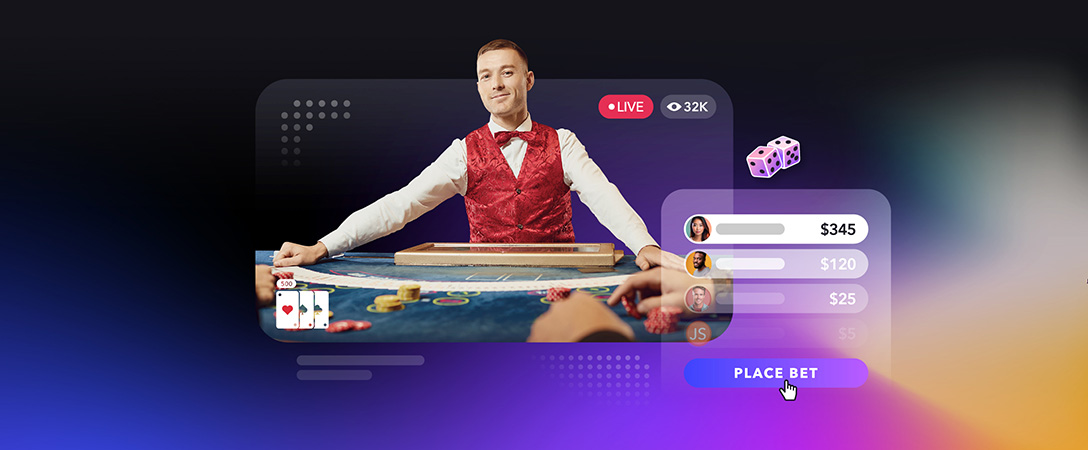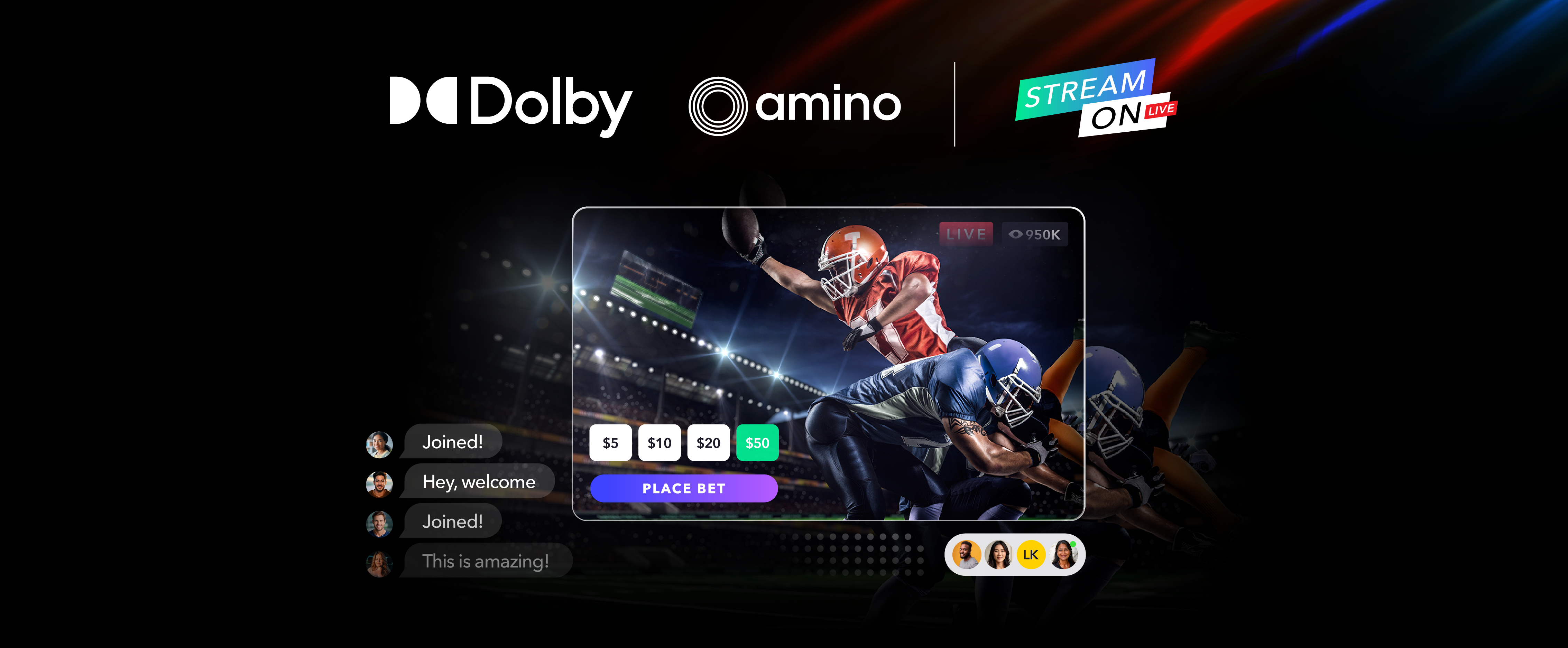Driven by rapid advancements in real-time streaming and mobile phones, the iGaming industry is transforming and innovating at an impressive speed. As more regions across the globe legalize online betting platforms, market predictions indicate the global iGaming market is poised to hit a staggering $153.57 billion by the year 20301.
To leverage new product and revenue opportunities, iGaming operators should differentiate themselves from the competition and cater to the demand for interactive, immersive, and social experiences.
In this guide, we’ll highlight the essential real-time capabilities you’ll need to effectively maximize your iGaming return on investment (ROI).
How does real-time streaming impact iGaming?
Real-time streaming enables a higher frequency of game rounds for online casinos. This increases the level of player engagement and boosts the quantity of bets placed. It also offers live sports bookmakers a distinct advantage by allowing them to expand their betting or booking window, providing more time for wagers to be placed and increasing their revenue.
Increase your handle
In contrast, streaming with a latency delay of 15 to 30 seconds can significantly disrupt the flow of gameplay. In fast-paced iGaming scenarios such as live horse racing, this delay could mean the difference between placing a bet in time or missing a betting window entirely.
A fair and compliant betting experience
Live betting online needs to be a fair experience for players to ensure trust, build long-term customer relationships, and maintain the integrity of the gaming industry. Moreover, fairness in live betting is necessary to meet industry standards and regulations which are designed to protect players and promote responsible gambling.
Dolby OptiView delivers lightning-fast video to global players in real time, for a fair and compliant betting experience. Our unique CDN architecture enables synchronized high-quality, player experiences by delivering real-time video to up to a million simultaneous players worldwide, all in under 500 milliseconds.
5G mobile iGaming and the rise of Progressive Web Apps (PWA)
With its ultra-low latency and high-speed connectivity, 5G is revolutionizing the gaming industry by enabling immersive virtual reality gaming experiences that were not previously possible.
5G technology also allows for real-time interaction and collaboration in virtual environments without delays, creating a more immersive gaming experience.
The rise in mobile-first gaming is largely driven by Progressive Web Apps (PWA). These apps operate in any native player, bypassing the expensive and regulated app stores. This shift is redefining the landscape of mobile gaming, with PWAs offering a more accessible and cost-effective route for developers and users alike.
Live dealer casinos and live sports betting
With a growing demand for technology-driven entertainment in 2024, business operators will need to accommodate a diverse spectrum of iGaming enthusiasts, all while providing unique interactive experiences.
Online Casinos
Live dealer casinos have brought about a transformative change in the iGaming industry. They’re reshaping the landscape of online gaming by offering more interactive and immersive experiences and are seen as a significant force driving the future of the industry.
These platforms offer players the chance to interact with live dealers and competitors, enhanced by high-definition audio and visual features.
Another key benefit for iGaming operators is the ability to offer attractive sign-up bonuses and promotions, such as welcome bonuses, free spins, and loyalty rewards. These incentives not only attract new players but also promote player retention, which can lead to higher profits in the long term.

In-play wagers and microbetting
Live sports betting significantly relies on real-time streaming for various aspects of the viewer experience. WebRTC technology has become an integral part of placing a wager online, providing up-to-the-second updates that are critical for in-play and microbetting scenarios.
The main difference between in-play betting and microbetting lies in their scope and time frame. In-play betting encompasses wagers placed on various aspects of a sports event while it is ongoing, while microbetting focuses on placing rapid, small bets on quick outcomes within the larger context of a game.
Bettors can now leverage real-time information to make split-second decisions, increasing their chances of securing profitable outcomes. Whether it’s predicting the next point in a tennis match or determining the result of a penalty kick, real-time streaming equips bettors with the ability to immerse themselves fully in the game.
Data-driven insights
Real-time streaming not only provides an avenue for fans and bettors to be part of sports events as they unfold, but it also reveals a world of data-driven insights. Statistics available in real-time offer bettors the ability to analyze and make data-driven decisions.
Due to the swift nature of live sports, the odds can shift in an instant, and any lag or delay in live streaming may result in lost chances, deceptive betting, or inaccurate wagers. Platforms that offer real-time streaming provide bettors with the advantage of staying updated and refining their betting tactics for optimal results.
The advantage for iGaming operators lies in player retention. By cultivating loyal players who repeatedly return to your sports betting app, the continued engagement boosts the lifetime value of each player.
Multiview: empower your viewers
Having the ability to select the camera angle for a personalized video streaming experience can greatly enhance the viewer’s enjoyment and caters to the growing demand for personalized and engaging content. Here’s why:
Control
It puts the viewer in the director’s seat, allowing them to focus on what they find most interesting or relevant in the live stream.
Personalization
Every viewer has different interests and priorities. Being able to choose the camera angle allows for a tailored viewing experience that aligns with individual preferences.
Enhanced understanding
Every viewer has different interests and priorities. Being able to choose the camera angle allows for a tailored viewing experience that aligns with individual preferences.
Immersive experience
Selecting their own angles can make viewers feel more immersed in the event, creating a more interactive and engaging experience.
Unlock additional revenue opportunities
Real-time streaming enables significant revenue opportunities with engaging viewer experiences and contextual advertising.
Brand sponsorship
Contextual gamification opens up a lucrative revenue stream by allowing brands to sponsor games, thus generating sponsorship fees. Additionally, it incentivizes player engagement and retention as players can earn points, make in-game purchases, and win prizes. This constant interaction leads to increased player spending, boosting the overall revenue.
Contextual ads
An additional strategy for generating revenue involves engaging advertisements and context-specific ads. These types of contextual ads are more likely to resonate with the viewer because they are related to the content the viewer is already interested in, making them potentially more effective for user interaction.
Personalized user experiences play a pivotal role as it allows advertisers to target specific audiences based on their interests and geographical location, enhancing ad relevance and engagement.
This approach also includes showcasing AI-powered advertisements that are tailored based on the viewer’s personal data and browsing history.
Immersive social interaction features
The incorporation of real-time chat, competition, and collaboration features are crucial for iGaming operators. The ability to interact, compete, and work together with other players brings an added layer of thrill and involvement to the iGaming experience. This not only elevates the entertainment factor of the games, but also provides a strong incentive for players to come back – the opportunity to socialize with others.
This sense of community and excitement of the game are key factors in iGaming’s appeal and its capacity to keep players engaged over a long period. This sustained engagement is critical for generating revenue as it translates into more frequent play, and potentially, increased spending within the game.

The rise of augmented and virtual reality
The integration of virtual reality (VR) in live casinos and sports is emerging as a lucrative sector within the iGaming industry. By enhancing user engagement and minimizing operational expenses, this technology is paving the way for significant financial gains for operators. These highly immersive experiences allow users to virtually attend live sports events in stadiums or engage in casino games like blackjack, complete with a live dealer.
This not only offers an enriched user experience, but also provides significant savings in terms of time and finances. The realistic and interactive gaming experiences facilitated by AR and VR have the potential to revolutionize the way users connect with games and other players.
Local regulations and legal landscape
The spreading legalization of iGaming globally is poised to drive increased revenue, attract larger audiences, and establish a more stable and reliable legal framework.
Reach a larger audience
The evolving legal environment is unlocking fresh avenues for iGaming operators to broaden their audience reach, a move that significantly bolsters revenue streams. The expanding customer base, driven by the transformative legal landscape, leads to increased player engagement and higher spending in online games and bets.
Meeting industry regulations
Ensuring that iGaming content is not streamed in regions where it is either illegal, subject to restrictions, or accessible to underage bettors is crucial for live casino and live sports operators. It maintains their compliance with the law, protects their reputation, and avoids potential fines or sanctions that can severely impact their business operations.
Dolby OptiView offers a multi-layered security approach aimed at fortifying your real-time streams against unauthorized access.
iGaming ROI use case
Enterprises such as Livespins are leveraging the power of real-time streaming technology to achieve impressive results and shift global views on live betting.
Business need
Correlate bets placed by online players behind gamers who are broadcasting their slot games in real-time.
The typical standard streaming delay by a mere 3 to 5 seconds would fall short of meeting the crucial conditions necessary for the successful execution of the game.

Solution: Sub-500ms latency
Together with the real-time streaming engineers at Dolby OptiView, the Livespins product was rapidly introduced to the market. They successfully executed the required real-time solution, enabling our team of WebRTC specialists to expedite the construction of the game architecture.
With its user engagement metrics showing that the “average rounds per player” is almost double compared to some of the most frequented slots, Livespins was able to significantly drive additional revenue.
Together with the real-time streaming engineers at Dolby OptiView (, the Livespins product was rapidly introduced to the market. They successfully executed the required real-time solution, enabling our team of WebRTC specialists to expedite the construction of the game architecture.
Michael Pederson, CCO of Livespins
| Challenges | Solutions | Livespins results |
|---|---|---|
| Need to be real-time video delivery <500ms. Even a 3-5 seconds delay is impossible for the player to correlate his bet with the bet that the streamer is placing. | Have experts construct the infrastructure and software as a service to build the WebRTC SFU and all related components. | Livespins was able to successfully correlate and implement bet behind in real time. |
| Combine high-quality audio and video streaming with the ability to interact. | Broadcast in 4K resolution, 10-bit HDR, and the highest color accuracy | Their premium product is sold on B2B basis to B2C online casino operators. |
| Have experts construct the infrastructure and software as a service to build the WebRTC SFU and all related components. | Our solutions engineers made it easy to integrate our interactive streaming solution in a short amount of time. | Their premium product is sold on B2B basis to B2C online casino operators. |
Conclusion
Maximizing ROI in the iGaming industry requires cutting-edge technology like real-time streaming. The use of WebRTC technology can significantly enhance user interactivity and the overall gaming experience, leading to higher player engagement and, consequently, greater returns.
- “Online Gambling Market Size Worth $153.57 Billion by 2030.” Market Research Reports & Consulting. Accessed February 1, 2024. https://www.grandviewresearch.com/press-release/global-online-gambling-market. ↩︎








